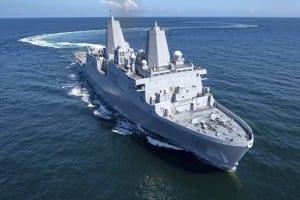The Navy and Marine Corps are trying to quickly add new capabilities to help support Navy sea control and power projection missions, particularly arming amphibious vessels with anti-ship weapons.
Marine Maj. Gen. Tracy King, Director, Expeditionary Warfare (OPNAV N95) said amphibious ships need to operate as “if it floats, it fights,” especially the San Antonio-class amphibious transport docks (LPD-17).

“I think that the LPDs need the ability to reach out and defend themselves and sink another ship. And it’s not from the aspect of using them as a strike platform. To me, it will drastically increase their survivability if the enemy has to honor that threat. To me it’s sort of a brilliant flash of the obvious,” King said during press call with reporters on Jan. 8, ahead of the virtual Surface Navy Association symposium.
King said he is not concerned with what particular missile capability is added to LPDs, but sees the Naval Strike Missile (NSM) tested on Littoral Combat Ships (LCSs) as a strong option.
NSM is a long-range missile capable of destroying sea and land targets, with the Navy using it as an Over-The-Horizon capability on both the LCS and future Constellation-class frigates. It was originally developed by Norway’s Kongsberg, which is working with Raytheon Technologies [RTX] to integrate it into U.S. assets.
King said he thinks in 2021 the Navy and Marine Corps in will test fire a missile system off an amphibious ship “and let the fleet kind of play around with it to develop the doctrine and how we would use it, and to confirm or deny whether or not it’s worth the expense. Which we think it is here, but we need the operators to confirm that.”
During the symposium on Tuesday, King added that as a resource sponsor he’s concerned with the requirement, regardless of the specific missile.
“In my mind’s eye I think we need to test it, we need to let the fleet commanders play with one of them, probably in the next 12 months, which we’re on track to do that. And then come back to us and say you know what, this is something we really want or it’s something that we don’t.”
However, he said NSM is attractive due to an affordable cost during an expected “fiscally constrained environment.”
“I have watched with interest, the testing [of Naval Strike Missile] with the Gabby Giffords [LCS-10]. Seems like an affordable system, seems like a very lethal system.”
Regardless, King said he is working with Rear Adm. Paul Schlise, Director, Surface Warfare Division (OPNAV N96), to make sure his desire to increase LPD-17 lethality does not interfere with Schlise’s work with the LCSs. The Navy is adding NSMs to LCSs to up-arm vessels that have limited other offensive weapons.
Together they “have sat down with Raytheon several times” and King reported the company plans to increase production rates.
Last year at the symposium, Assistant Secretary of the Navy for Research, Development and Acquisition James Geurts said the service was looking at having the Marine Corps use NSM as a shore-based battery (Defense Daily, Jan. 16, 2020).
King continued that he does envision the NSM on an LPD-17 becoming an “adjunct battery for the fleet commander.”
“To me it’s about increasing the survivability, the very precious resources, with an affordable system that makes the enemy honor that threat. If you start throwing circles down on the map around every single warship…that’s what complicating an adversary’s calculus looks like to me.”
King said overall they are trying to get the Commandant of the Marine Corps’ guidance and promise to the Chief of Naval Operations “that he was going to uncoil some of the lethality of the MAGTG [Marine Air-Ground Task Force].”
“I don’t see why we can’t make that available to the ship’s captain,” whether it includes containerized weapons systems like a NSM or other capabilities.
“We proliferate the battlefield and the battlespace with these systems and we keep the enemy guessing as to who has what. To me that’s a good thing and I think that’s what the future holds,” King added.